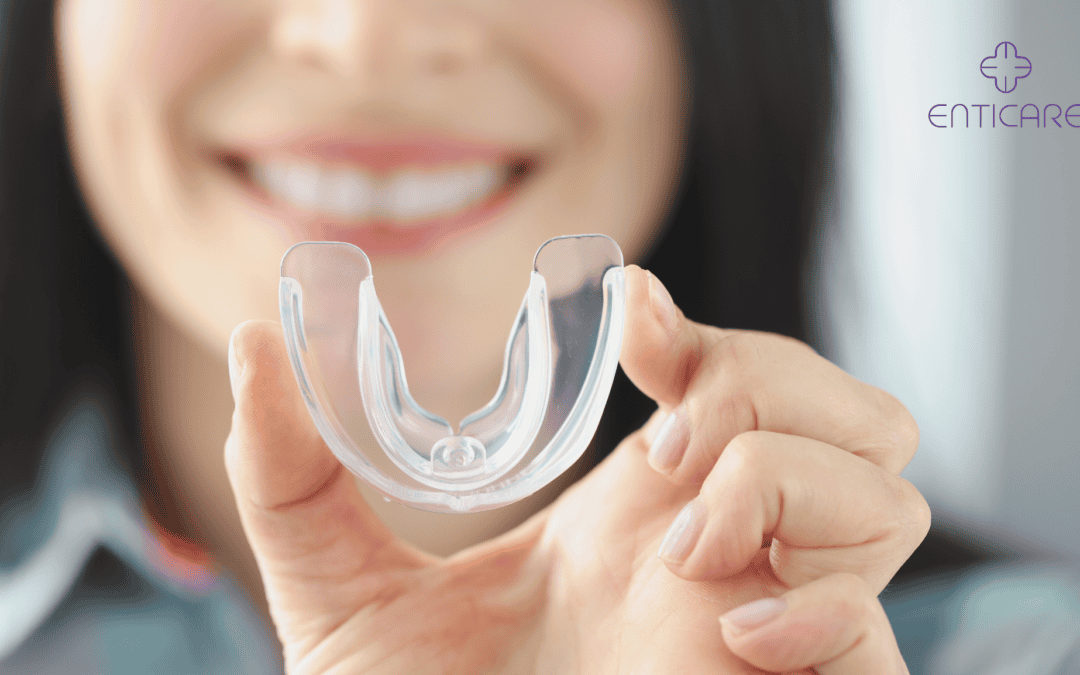Using Continuous Positive Airway Pressure (CPAP) machines is a common and effective treatment for sleep apnea, delivering air pressure to help with breathing during sleep. However, many users face issues such as dry mouth or noise from the machine. Additionally, many people who use CPAP therapy also need to wear a bite guard, often for issues such as teeth grinding or temporomandibular joint (TMJ) disorders. This raises the question: can you wear a bite guard with your CPAP mask? In this blog, we will explore this topic in detail, providing you with the information you need to manage both conditions effectively, including the role of apnea mouth guards in treating obstructive sleep apnea (OSA).
Understanding CPAP Therapy for Sleep Apnea
What is CPAP Therapy?
CPAP therapy involves using a machine that delivers a continuous stream of air through a mask to keep your airways open while you sleep. This therapy is crucial for individuals with obstructive sleep apnea (OSA) as it treats sleep apnea by preventing airway collapse and ensuring a steady flow of oxygen.
Benefits of CPAP Therapy
CPAP therapy can significantly improve the quality of sleep, reduce daytime sleepiness, and lower the risk of cardiovascular issues associated with sleep apnea. Consistent use of CPAP can enhance overall health and well-being.
Types of CPAP Masks
There are various types of CPAP masks available, including nasal masks, full-face masks, and nasal pillow masks. The choice of mask depends on individual preferences and specific medical needs.
The Role of Bite Guards
What is a Bite Guard?
A bite guard, also known as a night guard or occlusal guard, is a dental appliance worn over the teeth to protect them from grinding or clenching during sleep. It can also help alleviate symptoms of TMJ disorders.
Benefits of Using a Bite Guard
Wearing a bite guard can prevent tooth damage, reduce jaw pain, and improve sleep quality by minimizing the effects of bruxism (teeth grinding). It can also protect dental work and reduce the risk of developing TMJ-related issues.
Types of Bite Guards
Sleep apnea oral appliances come in different types, including over-the-counter options, custom-made guards from a dentist, and boil-and-bite guards that can be molded at home. Custom-made guards are typically the most effective and comfortable.
Combining CPAP Therapy with a Bite Guard
Compatibility Concerns
Many people wonder if they can use a bite guard and a CPAP mask simultaneously. For individuals with moderate sleep apnea, there is also the possibility of using alternative treatments like special oral appliances instead of CPAP therapy. Generally, it is possible to use both, but it may require some adjustments to ensure comfort and effectiveness.
Choosing the Right CPAP Mask
Selecting a CPAP mask that accommodates a bite guard is crucial. Nasal pillow masks and nasal masks often work well with bite guards, as they do not cover the mouth and allow more space for the appliance.
Fitting and Comfort
Proper fitting is essential when using a bite guard with a CPAP mask. Ensure that both devices fit well and do not interfere with each other. Consult your healthcare provider or dentist for guidance on achieving the best fit. Additionally, proper fitting is crucial for the effectiveness of oral appliance therapy, which can be a valuable alternative treatment for obstructive sleep apnea. Proper fitting is vital for treating sleep apnea effectively, as it ensures that the devices work correctly and provide the intended benefits.
Managing Common Issues
Mask Leaks
One common issue when using both a bite guard and a CPAP mask is the potential for mask leaks. Ensuring a proper seal and adjusting the mask as needed can help prevent leaks and maintain effective therapy.
Discomfort and Pressure Points
Wearing both devices may cause discomfort or pressure points. If you experience discomfort, try adjusting the fit of your CPAP mask or consult with your dentist to modify your bite guard. Proper fitting and adjustments of oral appliances are crucial to ensure comfort and effectiveness in treating obstructive sleep apnea. Oral appliances specifically designed to treat sleep apnea can provide a more targeted solution compared to standard night guards used for bruxism.
Adapting to Dual Use
Adapting to using both a bite guard and a CPAP mask may take some time. Proper adaptation is also crucial when using a sleep apnea mouth guard for effective treatment. Start with short periods and gradually increase the duration as you become more comfortable. Consistency is key to successful adaptation.
Tips for Effective Dual Use
Regular Maintenance
Regularly clean and maintain both your CPAP equipment and bite guard to ensure hygiene and effectiveness. Follow the manufacturer’s instructions for cleaning and replacing parts as needed.
Professional Guidance
Consult your healthcare provider and dentist for professional guidance on using both devices. They can offer personalized advice and adjustments to enhance comfort and compliance.
Monitoring and Adjustments
Regularly monitor your sleep quality and any symptoms of discomfort. Make necessary adjustments to your CPAP settings or bite guard fit to optimize therapy and achieve the best results.
Conclusion
Using a bite guard with your CPAP mask is possible with the right approach and adjustments. By understanding the compatibility, managing common issues, and seeking professional guidance, you can effectively manage both conditions and enjoy a restful night’s sleep. For personalized advice and support, schedule an appointment with our experts at Enticare. Take the first step towards better sleep and improved health today.

